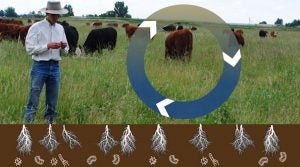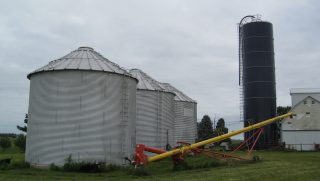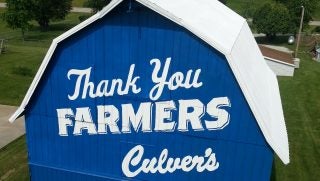Forbes contributor Brian Kateman released an opinion piece titled, New Technologies Make Factory Farming More Palatable. That’s Not Good Enough, that mocks recent advances in technology within the agricultural community. He mostly criticized emerging innovations aimed at mitigating methane emissions from cattle, calling them “absurd,” despite the great strides they have made in making beef and dairy more sustainable.
Kateman is co-founder of the Reducetarian Foundation, a self-proclaimed activist organization that works to stop the consumption of animal products. Based on what I read in the article, here are four false accusations that Kateman made about animal agriculture and my counterarguments to his claims.
Quote #1: “Importantly, all of these proposals for reducing methane fail to address any of the other negative impacts of animal agriculture: polluted water from farm runoff, the considerable water usage (about 1,800 gallons) required to produce even one pound of beef, the 80% of agricultural land used to produce a food that provides less than 20% of the world’s calories.”
Counterargument: In fact, the majority of water used to produce beef is rainwater. Beef provides a punch of high-quality essential nutrients in a small package and provide us with thousands of byproducts that we use in our daily lives. And water? Claiming a high number of gallons, but let’s compare and debunk their claims here.
Farmers are keeping nutrients out of precious water sources by keeping them on the field and must legally comply with hundreds of environmental regulations.
Quote #2: “Even if you’re ethically unbothered by the idea of raising animals for slaughter, few would deny that the modern industrial animal agriculture system puts animals through grotesquely cruel experiences throughout their lives.”
Counterargument: Um, we deny it! If you’ve ever visited the social pages of TDF Honest Farming or Iowa Dairy Farmer, you will know how ridiculous this statement sounds. Modern farmers spoil their livestock with everything they could ever need to be comfortable and content.
Livestock are provided with feed formulated by expert animal nutritionists and tailored to their life stage. Dairy cows in particular receive all the benefits of a five-star resort, including tail-massaging rotary brushes, soft sand pillow beds to rest at any time, and automatic robotic milkers that gets the job done at their own convenience. The better we treat them, the better they treat us.
Quote #3: “The repeated, forced insemination of female cows who are soon separated from their calves (the males of which are then tightly confined to prevent the development of muscle and then slaughtered at 20 weeks old for veal), the dehorning by cauterization, the tail docking, the entire lives spent indoors on a concrete-floored enclosure.”
Counterargument: Another tired hyperbolic claim from vegan animal-rights extremists. Artificial insemination is a calm, painless process for a dairy cow, and they often are not bothered to even walk away during the event. Without a doubt, it is much less traumatic than being forcefully bred by a heavy bull that could injure the cow.
In general, dairy cows are not known to be the most maternal. Separating the cow and calf is a practice based on many generations of animal husbandry practices and sound science to better monitor the calf’s growth, feed intake, and overall health.
Veal calves are raised in group pens where they can walk around freely and interact with other calves. Indoor housing allows farmers to keep the animals protected from the elements and provide more individualized care.
Quote #4: “How are dietary supplements, masks, or backpacks more realistic, let alone more economical, than just cutting back on our consumption of animal protein?”
Counterargument: Emerging technologies that aim to reduce methane emissions from cows demonstrate farmers’ and ranchers’ commitment to continuous improvement in reducing their ecological footprint. The fact is people will never stop eating meat, fish and dairy, and as our population grows, so does the global demand.

So, would you prefer that the animal ag community stop seeking sustainable solutions altogether? No, because each innovation, no matter how seemingly impractical, is doing only good for the name and reputation of modern agriculture. Agriculture is the only industry that is capable of being net-zero, and in many existing cases, net-negative. What’s not good enough is the minimal efforts of corporations to reduce emissions in larger industrial sectors like automotive and manufacturing, which together represent 51 percent of U.S. emissions as of 2020.
Conclusion: It is highly unfortunate that Forbes gives these contributors an elevated platform from which to spread contextless and biased opinions. Kateman is dedicated to eliminating meat, fish, dairy, and eggs from consumers’ plates — so much so that he’s built a platform around his term “reducetarian,” which he says relates to reducing meat consumption. His biographical information lists no previous experience in the agricultural community, while he focuses on environmental communication in the classroom. It’s disappointing that he feels qualified to critique a community and belittle farmers’ and ranchers’ accomplishments of making agricultural production more sustainable, while they work to improve a way of life that they believe in.
But for Kateman, that’s apparently not good enough.
Michelle Miller, the “Farm Babe,” is an internationally recognized keynote speaker, writer, and social media influencer and travels full time to advocate for agriculture. She comes from an Iowa-based row crop and livestock farming background and now resides on a timber farm in North Central Florida.



